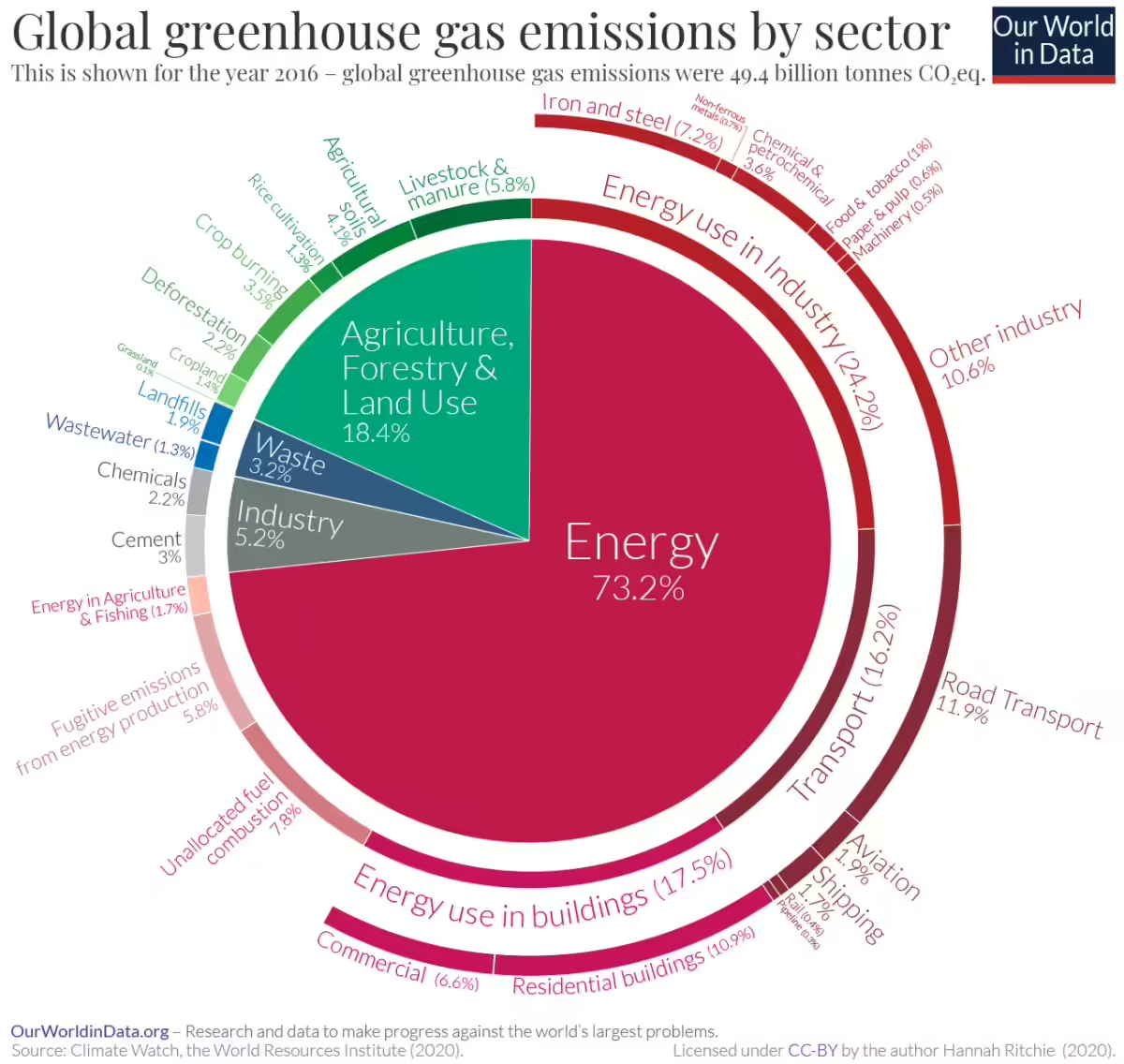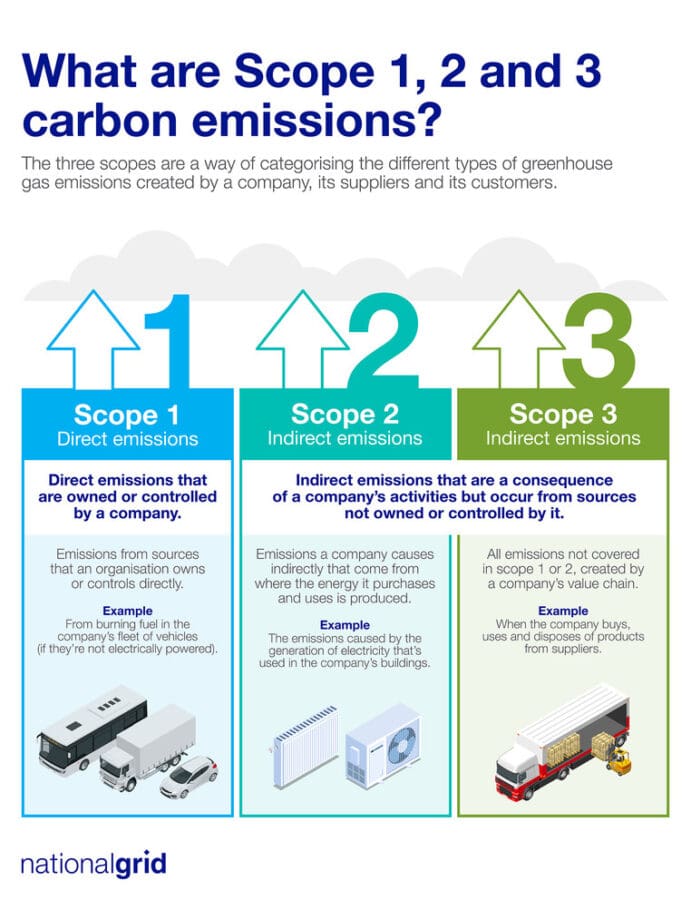
Carbon accounting is like a smartwatch for your business. Just as a smartwatch tracks vital metrics like heart rate and sleep patterns to improve personal health, carbon accounting monitors your business’s carbon emissions to enhance its environmental health. By understanding your carbon footprint, you can make informed decisions to reduce your environmental impact and achieve sustainability goals.
Why Does Carbon Accounting Matter?
The emissions of CO2 (carbon dioxide) and other greenhouse gases (GHG)—from industries like agriculture, energy, transportation, and manufacturing—disrupt the earth’s carbon cycle. This leads to rising temperatures (climate change) and environmental harm, such as ocean acidification and extreme weather events, which impact ecosystems, human health, and economies.
When your business uses energy, fuels, or raw materials, it contributes to climate change. Carbon accounting provides the data needed to assess your emissions and identify where you can reduce them. This is particularly important as governments worldwide implement mandatory emissions reporting regulations, making carbon accounting a necessity for businesses of all sizes.

Image source: https://ourworldindata.org/ghg-emissions-by-sector
What is Carbon Accounting?
Carbon accounting—sometimes referred to as a carbon footprint, emissions accounting, or carbon inventory—is the process of tracking a business’s CO2 emissions. In forestry, it can also mean calculating the carbon storage capabilities of ecosystems.
Is Carbon Accounting the Same as GHG Accounting?
Not quite. Carbon accounting focuses on CO2 emissions, while GHG accounting covers all greenhouse gases, including methane, nitrous oxide, and fluorinated gases. Since CO2 made up nearly 80% of total GHG emissions in the U.S. in 2022, most carbon tracking efforts focus heavily on this gas.
How Carbon Accounting Works: The Three Scopes
The Greenhouse Gas Protocol sets the standard for carbon accounting and divides emissions into three scopes:
- Scope 1: Direct Emissions
- Emissions generated directly by your company, such as fuel combustion, manufacturing, and equipment leaks.
- Scope 2: Indirect Emissions (Purchased Energy)
- Emissions resulting from the energy your business buys, such as electricity, heating, or cooling.
- Scope 3: Indirect Emissions (Value Chain)
- Emissions linked to your supply chain, such as product transportation, supplier operations, and product use.
Understanding these scopes is vital for creating a comprehensive emissions inventory.

Benefits of Carbon Accounting for Businesses
- Ensure Regulatory Compliance
- Meet local, regional, and international standards such as the Kyoto Protocol and Paris Agreement.
- Use frameworks like the Greenhouse Gas Protocol to comply with environmental policies.
- Reduce Costs and Drive Innovation
- Identify inefficiencies and reduce operational costs through renewable energy investments and improved processes.
- Encourage innovation by developing sustainable products and services that align with carbon accounting goals.
- Meet Customer Expectations
- Modern consumers demand climate-conscious businesses. Demonstrating your carbon accounting efforts enhances your brand’s reputation and builds trust.
- Support Sustainability Goals
- Accurate carbon accounting provides the insights needed to design effective emissions reduction strategies and measure progress.
Overcoming Challenges in Carbon Accounting
Carbon accounting can get complex, especially for Scope 3 emissions, which often require data from suppliers and partners. To simplify the process:
- Use guidance from the GHG Protocol.
- Invest in carbon accounting software.
- Work with an experienced carbon management consultant to ensure accuracy and compliance.
How Carbon Accounting Supports Sustainability Goals
Carbon accounting is more than a measurement tool; it’s a critical step toward achieving long-term sustainability. By identifying emission hotspots, businesses can create targeted strategies to reduce their carbon footprint.
Investing in tools and expertise for carbon accounting helps businesses:
- Align with climate change goals.
- Build credibility in their sustainability efforts.
- Gain a competitive edge in an increasingly eco-conscious market.
Are You Ready to Get Started?
If you’re ready to take control of your carbon emissions, check out Unity Environmental University’s Sustainable Business Management (SBM) program. Gain practical skills in:
- Carbon emissions inventory calculations (Scope 1, 2, and 3).
- Carbon offsetting strategies.
- International policy frameworks.
- Effective emissions reduction techniques.
- Ethical considerations
Final Thoughts
Carbon accounting is a vital practice for businesses that care about their impact on the planet. By integrating this tool into your operations, you can drive innovation, meet regulatory requirements, and build a more sustainable future.
Start your carbon accounting journey today—because a healthier planet is everyone’s business.
This blog was written by Michele Villinski and Jessica Young with the assistance of AI language model ChatGPT (OpenAI, 2024).



